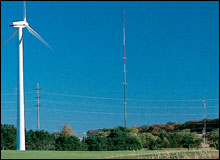Thriving Communities / News & Views / Articles from 1995 to 2012 / When Ecology Drives an Economy
When Ecology Drives an Economy
Grand Traverse region grapples with transit’s role in preserving its Up North charm
February 17, 2003 | By Johanna Miller
Great Lakes Bulletin News Service
 | |
| Kimberli Bindschatel | |
| A BATA Way To Go: Moving more people by bus can help the Grand Traverse region protect its beauty and keep its stunning lakes and bays clean. |
If there’s a place in Michigan that shouldn’t worry much about attracting residents and workers, it’s Traverse City and the Grand Traverse region. Like liquid magnets, aquamarine lakes and bays draw tens of thousands of people each summer. Enchanted by the experience, many eventually move there.
But as numerous lifelong residents will testify, there’s trouble in this particular paradise. The region’s population has grown by 20 percent in just 10 years. Sprawl stretches back from the region’s shores and across its beautiful hills and forests as ever more roads, cars, suburban-style housing developments, and strip malls threaten the area’s natural beauty, water quality, and small-town charm.
Will the region sacrifice the natural assets that drive its economic development? Or will citizens and leaders shape the burgeoning growth in ways that preserve the rural character? Will they take the next step in improving their public transportation system and help curb the pressure to carve up more forests and farmland with still more roads?
 |
| Dallas Area Rapid Transit |
| Power Tools: BATA hopes to run buses on clean wind energy. |
Last November’s election showed just how hard the region’s voters are struggling with these questions. Citizens in Leelanau and Grand Traverse counties narrowly rejected a modest property tax increase to buy cleaner, hybrid-electric buses and expand the Bay Area Transportation Authority’s (BATA) permanent daily routes further into those counties. Yet, just north of Traverse City, voters approved a millage increase to protect farmland on Old Mission Peninsula.
“We’re a tourist-based economy,” said Rob Bacigalupi, deputy director of Traverse City’s Downtown Development Authority and a BATA board member. “We care about our environment, scenery, and quality of life. At some point we have to make a choice: What kind of region do we want to be?”

There’s still time for Traverse City to learn from other cities’ successes. Burlington, Vermont is comparable to Traverse City in beauty, geography, and charm. In 2000 Burlington acted to prevent its surging popularity from turning into terminal gridlock when, in conjunction with local, state, and federal government officials and area businesses, the Chittenden County Transportation Authority launched a new commuter rail service. Running along the region’s most congested corridor from the city to nearby Charlotte, the 12-mile-long commuter rail line has made it easier for both tourists and workers to get where they want to go.
“The commuter rail has helped reduce congestion along the Route 7 corridor,” said Jim Fitzgerald, general manager of the Champlain Flyer commuter line. “It’s also helped reduce pollution and fuel consumption.”
BATA officials hope to do that and more.
“We not only want to provide a service that people will want to ride, but also do something to help keep the region clean,” noted BATA’s Executive Director Joe DeKoning. For instance BATA wants to build its own wind turbine to generate clean electricity to power its buses.
Mr. DeKoning said a shaky economy and anti-tax sentiment helped defeat the 2002 millage request. He is optimistic that when the agency asks voters again this year for their support the measure will pass. In the meantime BATA will work hard to discern what the communities it serves really want from their bus system.
But Traverse City Mayor Margaret Dodd, once a self-proclaimed champion of transit, thinks BATA must overcome some significant hurdles before it can succeed.

When Ecology Drives an Economy
Grand Traverse region grapples with transit’s role in preserving its Up North charm
“Public transit is an expensive option in Traverse City, given that every level of government is strapped for money right now,” she said. “Public transit has to be efficient and effective and the current system is neither right now.”
To keep and build its public funding and support, BATA’s operation must make good financial sense. That will require better marketing tools and education, and urban planning that favors more compact development. Without those central principles, it will be difficult to establish a truly successful transit system in the Grand Traverse region.
Many county commissioners, including Grand Traverse commissioner and BATA Board member Herb Lemcool, still believe in regional public transportation.
“It’s an investment in our resources and our community,” noted Mr. Lemcool. “People that don’t use BATA or don’t think they ever will can’t see the value in it and don’t want to pay for it, but as our population ages more and more people will need it as a way to get around town.”
CONTACTS:
• Rob Bacigalupi, 231-922-2050,
• Joe DeKoning, 231-941-2355,
• Margaret Dodd, 231-947-6913
• Herb Lemcool, 231-943-9040
On Board: Partnership Saves Money, Gives Students Choices >>





